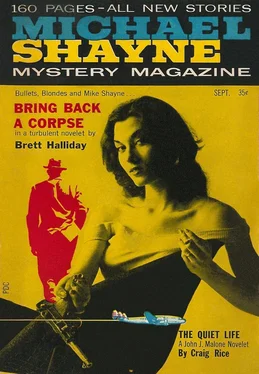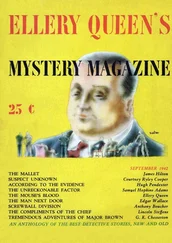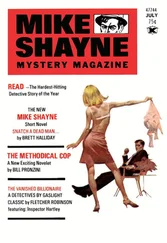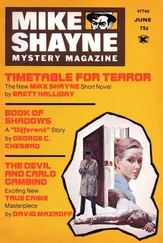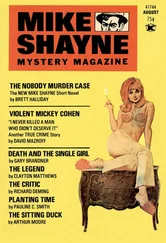Robert Bloch - Michael Shayne Mystery Magazine. Vol. 1, No. 1. September 1956
Здесь есть возможность читать онлайн «Robert Bloch - Michael Shayne Mystery Magazine. Vol. 1, No. 1. September 1956» весь текст электронной книги совершенно бесплатно (целиком полную версию без сокращений). В некоторых случаях можно слушать аудио, скачать через торрент в формате fb2 и присутствует краткое содержание. Город: New York, Год выпуска: 1956, Издательство: Renown Publications, Жанр: Детектив, на английском языке. Описание произведения, (предисловие) а так же отзывы посетителей доступны на портале библиотеки ЛибКат.
- Название:Michael Shayne Mystery Magazine. Vol. 1, No. 1. September 1956
- Автор:
- Издательство:Renown Publications
- Жанр:
- Год:1956
- Город:New York
- ISBN:нет данных
- Рейтинг книги:3 / 5. Голосов: 1
-
Избранное:Добавить в избранное
- Отзывы:
-
Ваша оценка:
- 60
- 1
- 2
- 3
- 4
- 5
Michael Shayne Mystery Magazine. Vol. 1, No. 1. September 1956: краткое содержание, описание и аннотация
Предлагаем к чтению аннотацию, описание, краткое содержание или предисловие (зависит от того, что написал сам автор книги «Michael Shayne Mystery Magazine. Vol. 1, No. 1. September 1956»). Если вы не нашли необходимую информацию о книге — напишите в комментариях, мы постараемся отыскать её.
Michael Shayne Mystery Magazine. Vol. 1, No. 1. September 1956 — читать онлайн бесплатно полную книгу (весь текст) целиком
Ниже представлен текст книги, разбитый по страницам. Система сохранения места последней прочитанной страницы, позволяет с удобством читать онлайн бесплатно книгу «Michael Shayne Mystery Magazine. Vol. 1, No. 1. September 1956», без необходимости каждый раз заново искать на чём Вы остановились. Поставьте закладку, и сможете в любой момент перейти на страницу, на которой закончили чтение.
Интервал:
Закладка:
The lieutenant’s sympathy was partly habit, but he showed a trace of real curiosity, as well. “Why do you say that, Mr. Brown? How can you be so sure?”
Brown opened his mouth to tell him why. It could not be coincidence that two of his wives, unknown to each other, had died by their own hands within a matter of days. But he checked himself in time. The mere existence of his surplus marriages, if exposed, spelled ruin.
“It wouldn’t be like her,” he said lamely. Then he collected his shattered wits and marshalled the solid facts of his alibi.
They were good enough for Lieutenant-detective Todd. The widower had been having lunch in a quiet restaurant, fifty miles away, at the hour Lucille drank a cocktail, an old-fashioned this time, loaded with cyanide. She had been alone in the house, in the downstairs bar. The bottle of liquor used in the drink also held cyanide.
An old, dusty tin of the substance had been found among the hand-wrought bracelets, brooches and costume novelties in which Lucille dabbled, as a hobby. Again, there was no note. But Lieutenant Todd told Brown that this happened more often than most people thought.
Three days later, the same iron-clad story satisfied Detective-inspector Casey of the Boston police, who was inquiring into the bizarre suicide of Mrs. Reynold B. Brown, housewife, of that city. Though hard-boiled, Casey and his fellow-officers were deeply touched by the protests of the bereaved husband that Helen couldn’t, wouldn’t and didn’t knowingly drink that deadly old-fashioned. Again! Their investigation would be thorough, but did Brown have any cold facts to support his refusal to accept suicide as the obvious conclusion? Anything at all except his intuition?
Brown did, indeed, have one overwhelming fact, but he was not in any position to offer it. Some unknown party or parties had a profound grudge against him and his wives, and was methodically carrying it to the extreme limit. But who? Of more immediate importance, who would be next?
The answer to the last question was simplicity itself. When they buried Helen, and Brown tried to pull his tangled thoughts together, he was at least able to perform a problem in elementary arithmetic — subtractions, unfortunately. By ruthless annulment — he hated to call it murder, in an affair so personal — he had only one wife left, Marion, in Camden.
As to the method used in Breaking up his happy homes, Brown had little doubt. Some inconspicuous person, a casual friend, even a complete stranger with some plausible tale, had in each case called upon the victim when she was alone. At some point, the hostess would suggest cocktails, and, when she had poured them, her attention must have been diverted long enough, or, perhaps, she had been decoyed from the room, while the fatal drink was prepared.
After that, it was easy. Thoroughly wash, then replace the second cocktail glass. Put some more cyanide in the already open bottle, then unobtrusively depart. To the police, each case was no mystery, because it stood alone. Only Brown knew there were three, that they were linked and what the link was. Only Brown and — a murderer.
But who had such a fanatical resentment against Brown, the happy home-builder, and his uncomplaining wives? It occurred to him that he might somehow have come to the notice of an avenging misogynist. Some crank who hated not only women but marriage, especially wholesale marriage. That, he thought, might well be it. Brown, personally, had few close friends. He had, as far as he knew, no enemies.
After Boston, his regular schedule called for a restful, relaxing two-day trip back to Camden and now, in spite of serious misgivings, he set out for the city on the Delaware. He was worried about Marion, among a lot of other problems. He had forgotten to phone her, immersed as he was in so many tragic details. He wondered if he should call her now, with a peremptory warning not to drink any cocktails with anybody, no matter who?
He decided against it. For one thing, Marion never drank cocktails. He had never known her to drink anything alcoholic, not even beer, and she ought to be invulnerable to the only technique the killer seemed to know.
For another thing, if he did phone, any strange injunctions of that sort would be awfully, awfully hard to explain.
IV
At seven o’clock on the evening of the sixteenth, the day and the hour he was expected, Brown rolled to a stop at the curb before his house in Camden. It was with relief that he found room to do so. The street was curiously empty of police and other too-familiar official vehicles. Marion met and greeted him at the front door, just as he reached it.
“Richard, darling!” she said, with warmth.
Even as they kissed, he spoke without thinking, from habit. “Yes. What’s the matter?”
“Nothing — why should there be? Did you have a nice trip?”
Brown recollected himself almost with a start. He shook his head and, at the same time, nodded, achieving a circular motion that might mean a lot, but was intended to signify nothing. He went on into the living room and, for a moment, stood in the middle of it, looking around. It, too, seemed rather empty, unpopulated as it was by hard-eyed but sympathetic detectives.
Could it be, that the nightmare was over? He wondered. Though the riddle might never be solved — and Brown realized all too well that an official solution would be most inconvenient — the devastation, at least, might have ended. A simple armistice, in fact, with no more casualties, might be the best, the most congenial, finish possible, all around.
Brown’s eyes were caught by an array of pamphlets, magazines, circulars, brochures, he had never seen before, certainly not on the table of his own living room. But their titles told him with ghastly clarity what they were — Harmonious Hearts, Why Wait for a Mate? Cupid’s Catalogue, The Widow’s Guide. Literature from a host of Lonely Hearts Clubs, that blight of amateurism upon a lofty profession. What were they doing here? Who put them there, in the first place?
He took a deep breath to bellow an enraged question, but changed his mind. He looked at Marion, who smiled brightly in return, as composed as ever. Tonight, however, she seemed even more composed. Suddenly, Richard did not want to hear the answer to his unspoken question. At least, he did not want to hear the right answer, and he was almost certain this was the answer she would give.
Let the little woman have her secret foibles, Brown decided. Silence was truly golden.
“Are you tired, Richard?” she asked. “Shall I mix us some cocktails?”
Us? Brown sagged into the nearest chair, missing the firm, encouraging support of Lieutenant Something-or-other, in Newark. But he managed a nod, even ventured a cautious query.
“Thanks, honey. Only I thought you don’t drink?”
Marion’s reply was forthright and cheery. “Oh, I do now. It came over me, maybe I’ve been missing something. So I forced myself to experiment with a cocktail here and there, just now and then, these last few days. And I found I enjoyed them. A little drink never hurt anyone, at least, not me. What would you like, an old-fashioned? A side-car?”
Brown was not aware that he had any preference, but Marion had already moved to perform the mixing. While the sound of ice-cubes, glasses and a serving tray clattered pleasantly from the kitchen, he thought hard about some of the phrases she had used. They were poorly chosen, no doubt about it.
Unless, of course, they were well-chosen, and intended to be. Had she meant, actually meant, a certain nerve-wracking interpretation that could be placed upon her words? An old-fashioned — or a side-car. These suggestions all too closely resembled bull’s-eyes.
Читать дальшеИнтервал:
Закладка:
Похожие книги на «Michael Shayne Mystery Magazine. Vol. 1, No. 1. September 1956»
Представляем Вашему вниманию похожие книги на «Michael Shayne Mystery Magazine. Vol. 1, No. 1. September 1956» списком для выбора. Мы отобрали схожую по названию и смыслу литературу в надежде предоставить читателям больше вариантов отыскать новые, интересные, ещё непрочитанные произведения.
Обсуждение, отзывы о книге «Michael Shayne Mystery Magazine. Vol. 1, No. 1. September 1956» и просто собственные мнения читателей. Оставьте ваши комментарии, напишите, что Вы думаете о произведении, его смысле или главных героях. Укажите что конкретно понравилось, а что нет, и почему Вы так считаете.
